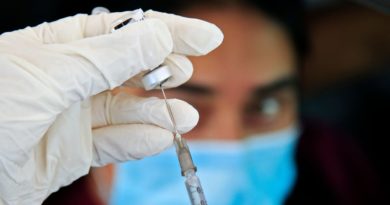Samoa has become a case study for ‘anti-vax’ success
By Michael Gerson,
Volunteers in the New Zealand city of Rotorua are in the process of sending two dozen handcrafted, infant-size coffins to the Pacific island of Samoa, which is currently in the midst of a deadly measles outbreak. The coffins are gifts to Samoan families who can’t afford them but suddenly need them. The smallest are decorated with felt flowers and butterflies.
That is one form of Samoa’s contact with the world. Another is anti-vaccination propaganda, much of it generated in the United States, that arrives through social media and discourages Samoan parents from vaccinating their children. This type of import has helped turn Samoa into a case study of “anti-vax” success — and increased the demand for tiny coffins decorated with flowers and butterflies.
Samoa is a reminder of a pre-vaccine past and the dystopian vision of a post-vaccine future. Its government has declared a state of emergency. Schools have been closed. Children under 17 have been banned from public gatherings. Unvaccinated families have been asked to hang red flags outside their homes so mobile vaccination teams can find them.
Like measles outbreaks generally do, the problem appeared rapidly. A few cases in October have mushroomed into more than 4,000 today. At least 70 (mainly children) are dead.
All of this was completely predictable. “In the absence of vaccination,” Anthony S. Fauci of the National Institutes of Health told me, “measles spreads rapidly among children and kills some of them. This happened consistently throughout the world, including the [United States], prior to the availability of the measles vaccines in the mid-1960s. This is exactly what is happening in Samoa today: widespread infection and death of children. . . . If you give history a chance, it will always repeat itself.”
When it comes to public health, science alone does not save lives. This requires science, plus healthy social norms. Cigarette use, for example, was reduced (in part) through the application of stigma. But vaccinations face a unique challenge. Public health is always just a few years away from catastrophe, because vaccination rates against infectious diseases need to be so high each year (generally 90 percent to 95 percent) to maintain herd protection.
Across the world, social norms on vaccination have run headlong into social media. Given the unrivaled power of Facebook and other platforms to cultivate conspiratorial paranoias, it is not easy to get 90 percent of any human population to think or do anything, particularly when it involves the infinitesimal risk of a bad reaction. When it comes to public health, a destructive fanatic doesn’t need to win an election to hurt people, just gain the support of a fringe.
The situation in Samoa has been complicated by a high-profile case of medical malpractice, in which two children died from adulterated vaccines. But the problem is always complex when it comes to putting drugs into currently healthy children. The social consensus for vaccination needs to be so strong that it overcomes the natural hesitance for nearly all parents. And maintaining that consensus isn’t easy when anti-vaxxers are a strong Internet presence. In Samoa, where Facebook is a main source of information, the vaccine coverage of children fell from 58 percent in 2017 to 31 percent in 2018. Local authorities have no doubt that social media played a role. “We’ve had children who have passed away,” said Samoa’s Communications Minister Afamasaga Rico Tupai, “after coming to the hospital as a last resort and then we find out the anti-vaccine message has got to their families.”
In any sane society, the prevention of deadly, highly infectious diseases is a nonnegotiable public commitment. Coercion must be set at whatever level is necessary to ensure herd immunity. In Samoa, vaccination is now mandatory. One anti-vax campaigner (who recommends the treatment of measles with a papaya leaf extract) has been arrested. This is admittedly harsh. But amid a public-health crisis, this type of speech is like crying “remain seated” in a burning theater.
Conviction, however, is much better than coercion. And the United States would be a better carrier of a pro-science, pro-health, pro-vaccine message if some prominent Americans did not feed anti-vax conspiracy theories on social media. The crisis in Samoa would be an excellent opportunity for President Trump to repudiate such views, which he regularly peddled before entering office. The sudden arrival of Middle East peace, however, is more likely than the president admitting an error — even an error with potentially deadly consequences.
Dr. Sheldon Yett, the UNICEF representative to the Pacific, has put the case bluntly: “People who are spreading lies and misinformation about vaccinations are killing children.” Such lies are among the United States’ worst exports to the world.
Read more from Michael Gerson’s archive, follow him on Twitter or subscribe to his updates on Facebook
.
Read more: Juliette Kayyem: Anti-vaxxers are dangerous. Make them face isolation, fines, arrests. The Post’s View: The measles outbreak in Samoa must be a lesson for the rest of the world Michael Gerson: Advent teaches us that hope is not a cruel joke Molly Roberts: Tech platforms must move against the anti-vaxxers now The Post’s View: The vaccine challenge isn’t just about getting shots


